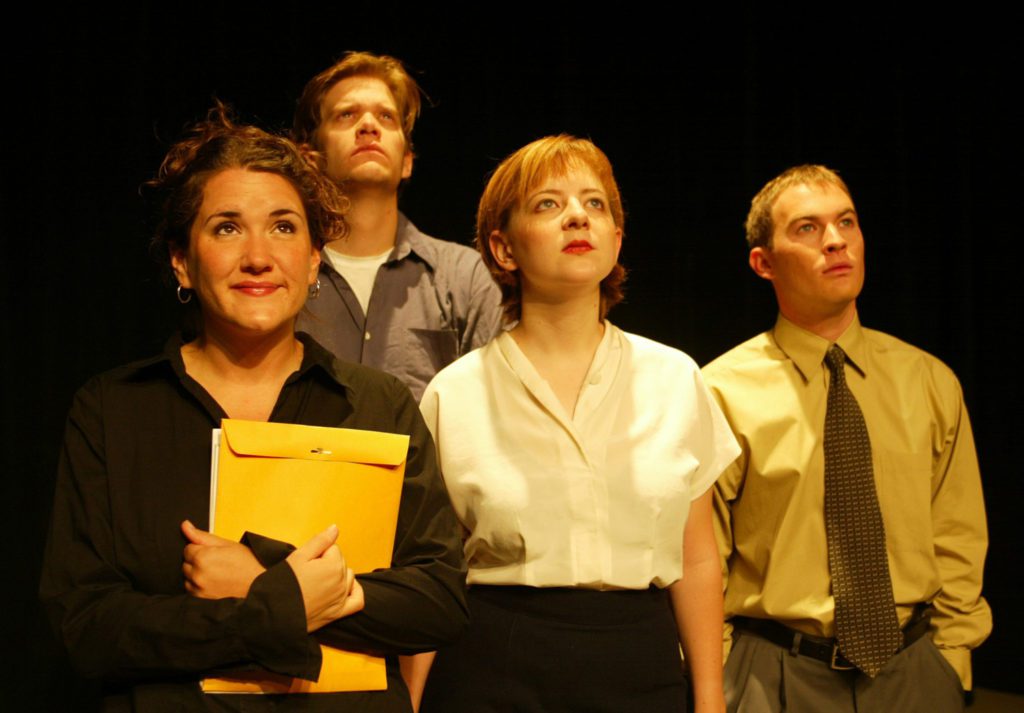All aboard the Buntport bandwagon.
I have grown completely enamored of Denver’s Buntport Theater Company. After taking in the latest brilliant effort in a steady stream of groundbreaking original material from its seven wits, I can announce that I would watch anything these kids came up with anywhere and at any time.
Why, I’d watch them stand still in an elevator. I’d even watch them reinterpret the dustiest of old fairy tales.
And that’s just what they do in their 10th original work, “Misc.,” two one-acts titled “Elevator” and “< (Less Than) Cinderella.”
Buntport’s pieces aren’t always ingenious but they are always funny, surprising and wreathed in magic. Their writing and execution is both inspired and inspiring to anyone who appreciates the difficulty of the creative process.
The beauty of “Misc.” is that it does not rely on the company’s well-established individual talents. This is a risky conceit that constitutes a confident leap forward in the complexity of their repertoire. And they do all this without a set.
“Elevator” is a 45-minute look inside the minds of four strangers during one short and awkward elevator ride; while “< (Less Than) Cinderella” is the classic story performed without discernible words. That might seem like a disparate match, but these are companion pieces. The first story must be communicated with minimal movement; the second only with movement and sound.
The evening opens with a square pool of light on the floor that represents an elevator’s interior. First we witness the actual, seemingly uneventful two-minute elevator ride in a generic office building, the kind where strangers feign tolerance for only as many floors as they must travel. The sole dialogue comes from one man informing another that he has a spot on his shirt. The elevator stops and a woman gets on; she also becomes the first to get off.
After a short blackout we see the same event unfold again, only this time without the constriction of time. Now we hear detailed thoughts, and it’s soon evident that every glance and weight shift we saw in the first scene was a clue to understanding the longer version of the same story.
Because the writing is smart and concise, we soon know the characters intimately: Erik Edborg is a washed-up and terrified novelist heading to a pitch meeting without a pitch; Erin Rollman is the unknowing underling from the same office assigned to meet with this writer; and Evan Weissman is a claustrophobic man contemplating suicide. When the elevator stops, Hannah Duggan injects a lightning rod of wicked energy as a woman who revels in knowing her quick one-floor ride is a rude aggravation.
The dialogue is based on a creative-dramatics game called “Radio,” where actors stand side by side, each representing a radio station. Each time the leader turns “the dial,” a new person picks up speaking where the other left off.
But here what we hear are not just randomly improvised thoughts. These are delicately interwoven transitions that flow with the rhythm of the elevator car. The tone grows from inanely comic observations (did you know that Keanu spells “unique” backward … “only wrong”?) to more metaphorical ruminations on the nature of experience to finally, some rather sad realizations about the inadequacies of their lives.
While “Elevator” is a successful experiment, “< (Less Than) Cinderella” is an epic opera of movement. It most obviously draws on the masks, puppetry and spectacle of commedia dell’arte, and the costumes and ritual of Kabuki, but it is above all a nod to silent film clowns such as Charlie Chaplin and Harold Lloyd. In 1936, long after the advent of talkies, Chaplin’s classic “Modern Times” included his first spoken words on film a gibberish song meant as a rebuke to talking pictures.
Buntport honors that classic moment by having the narrator (Weissman), Cinderella (a remarkable, impeccable Edborg), her stepsister (Duggan) and stepmother (Rollman) communicate in garble. At Colorado College the Buntporters were schooled in transformational theater by Bulgarians; those Eastern European influences flavor this entire work.
The transformations are lessons in originality: Edborg morphs from ugly Cinderella into a princess, and Weissman from the narrator into the prince.
But how Rollman turns from Cinderella’s mother dying in childbirth into the wicked stepmother right before our eyes is a creative tour-de-force. When she turns her back on the audience, her flip side is the evil one. Rollman wears a mask on the back of her head, and her backward clothes and shoes create the illusion of the front of another person. From then on Rollman walks only backward, which is forward for her new character, complete with behind-the-back hand gestures. Her backward line dance is a memory to treasure.
The Buntport team could not pull this off without the visual and audio support of SamAnTha Schmitz and Matt Petraglia. The latter’s masterful soundtrack includes songs such as Fats Waller’s “Your Feet’s Too Big.” (Guess where that one comes in?)
The miracle of Buntport’s opus is that this is textbook minimalism. With only their imaginations and intellect, they have conjured the illusion of a world far bigger than our comprehension.
-John Moore, September 24, 2003, Denver Post
